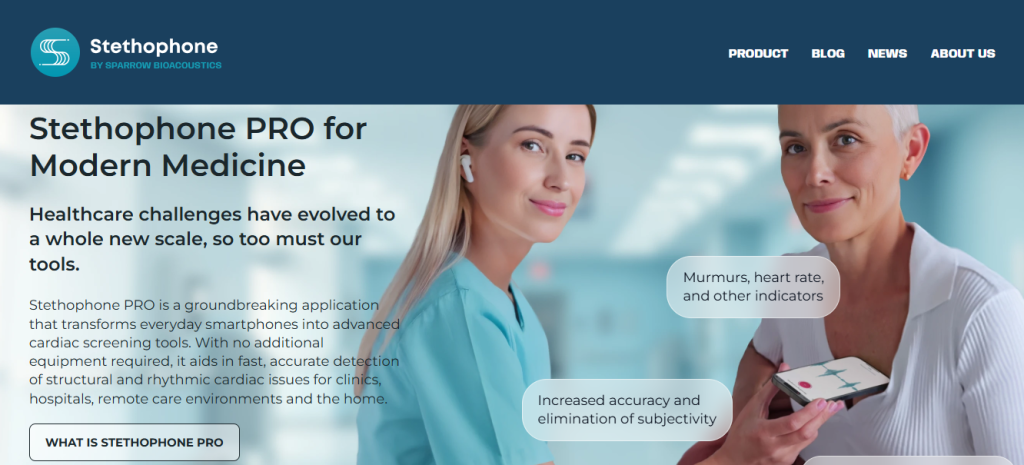Sparrow BioAcoustics Raises $10 Million to Turn Smartphones Into Clinical-Grade Stethoscopes
November 2, 2025
byFenoms Start-Ups

Sparrow BioAcoustics, the digital health company redefining cardiopulmonary assessment, has raised $10 million in funding to expand development and commercialization of its flagship product, Echoes. The round includes investment from Killick Capital Inc., Klister Credit, Pelorus VC, 98827 Newfoundland & Labrador Inc., and Brinex Capital. Led by CEO Mark Opauszky and CTO Dr. Yaroslav Shpak, Sparrow is unlocking something medicine has never been able to do at scale: enable early detection of heart and lung abnormalities without specialized hardware. Echoes uses advanced signal processing and machine learning to analyze heart and lung sounds directly from an ordinary smartphone, allowing clinicians, caregivers, and even patients to detect irregularities that traditionally require a stethoscope or clinic environment.
Reframing Heart and Lung Diagnostics Through Software
For centuries, auscultation has depended on analog devices and clinical interpretation. The stethoscope, invented in 1816, remains foundational, yet it depends entirely on access, experience, and timing. Sparrow challenges that paradigm by shifting auscultation from a subjective, clinician-dependent tool into a data-driven, analyzable, and shareable diagnostic process. Echoes captures cardiopulmonary audio using smartphone microphones and transforms it into a structured digital signal that can be stored, compared over time, and algorithmically assessed. Where a traditional stethoscope limits insight to the clinician holding it, Sparrow enables remote monitoring, second opinions, and clinical escalation before symptoms worsen. Instead of requiring a visit, Sparrow allows detection to happen wherever the patient is. It doesn’t upgrade the stethoscope - it replaces the need for one.
Software Over Hardware: A Platform Strategy
Many medtech companies try to win by developing better devices, but Sparrow is pursuing a platform strategy that fundamentally changes the category. Echoes bypasses the need to manufacture or distribute specialized tools; instead, it allows millions of existing smartphones to function as clinical-grade auscultation devices. This approach eliminates hardware costs, accelerates adoption, and removes friction for both clinicians and patients. Because the platform operates on devices that users already own, Sparrow bypasses procurement cycles and training barriers that slow down traditional medical device adoption. Instead of designing new behavior, Sparrow inserts itself into behavior that already exists - patients already use phones for everything; Sparrow makes them diagnostic tools.
Deep Insight for Founders: Build Proof That Forces Adoption
Most startups build a product and then hope the market will adopt it. Sparrow built evidence and clinical necessity first, ensuring that adoption becomes the natural outcome rather than the hurdle. Instead of trying to convince physicians to change workflows, Sparrow designed a solution that fits into existing workflows with zero friction. The fastest way to scale in a regulated market is to remove the need for behavior change. Echoes doesn’t ask clinicians to abandon tools - it gives them superpowers using the device they already carry. And because Sparrow is capturing structured cardiopulmonary audio data, the company is not just enabling diagnosis; it is building the dataset that could become the backbone of future cardiopulmonary AI. Startups win faster when they stop trying to sell improvement and instead create inevitability.
Investor Confidence and Strategic Alignment
What makes this funding round notable is not just the capital but the type of investors involved. Killick Capital and Klister Credit signal strategic support toward scaling into enterprise healthcare and telemedicine integrations. Pelorus VC and Brinex Capital bring experience in software-led medical innovation, aligning with Sparrow’s thesis that the next wave of medtech market leaders will not be the companies that build more devices, but the companies that eliminate the need for them. Funding is flowing not because Sparrow is interesting, but because the model - smartphone as diagnostic platform - is positioned to become the dominant approach in remote cardiopulmonary care.
A Market Ready for Disruption
Cardiovascular disease remains the leading global cause of death, accounting for nearly 18 million deaths per year. Studies show that almost half of heart failure cases are diagnosed too late for optimal treatment, often because early signs go unnoticed or unassessed. At the same time, the remote monitoring and digital diagnostics market is accelerating rapidly, projected to reach $175 billion by 2027. The rise of hospital-at-home models, telehealth adoption, and physician shortages are creating urgent demand for tools that enable faster triage and earlier detection. The digital diagnostic category is expected to surpass $60 billion by 2030, boosted by AI-assisted medical assessments. And with global smartphone penetration around 85%, Sparrow’s addressable user base is effectively built in - no hardware barriers, no supply chain, no learning curve. The market is not just ready for this shift; it is actively waiting for it.
What’s Next for Sparrow BioAcoustics
With $10 million secured, Sparrow is accelerating its path toward FDA clearance while expanding clinical research partnerships across cardiology and respiratory specialties. The company is deepening integration with telemedicine platforms and preparing to scale its commercial footprint into hospitals, primary care networks, and emergency response systems. As Sparrow moves into its next stage, the goal is clear: turn Echoes into an ecosystem for continuous cardiopulmonary monitoring, where every smartphone becomes a frontline diagnostic tool. Sparrow is not creating another medical device category. It is creating a future where early detection doesn’t begin at the clinic - it begins in your hand.
Final Thoughts
Sparrow BioAcoustics’ $10 million raise signals a shift in how diagnostics will be performed moving forward. Echoes is not competing with stethoscopes or telehealth devices - it is competing with time, access, and preventable outcomes. By transforming smartphones into clinical-grade auscultation tools, Sparrow makes early cardiopulmonary detection universal instead of limited. In a world where delays cost lives, Sparrow makes detection immediate. The stethoscope changed medicine in 1816. Sparrow is changing it again in 2025.









